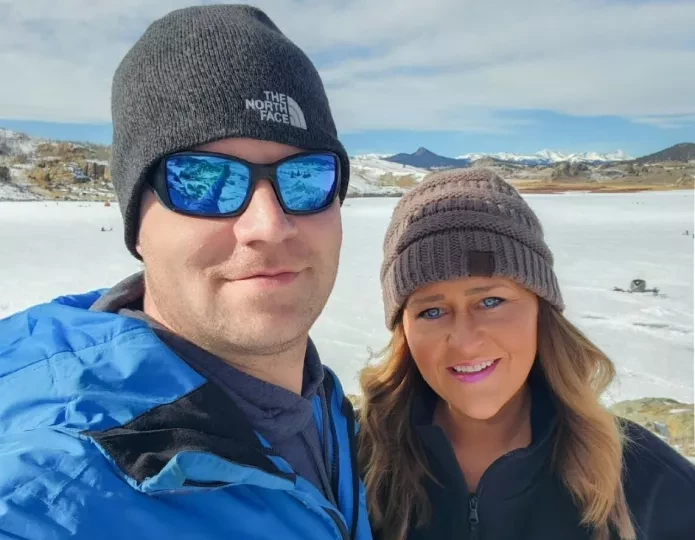As Erik embraced addiction wellness, he found freedom

Published Feb. 14, 2024
The number 11 has always had a special place in Erik’s family. His wife, Jenni, never fails to point out the time 11:11. Whenever they’ve looked at buying houses, the one with an 11 in the address was meant to be. And when Erik decided to start treatment for alcohol and marijuana on their 11th wedding anniversary, it marked a significant turning point.
“I never thought it was possible,” he said. “I always heard people say it’s amazing what you can do in recovery, but I never thought I’d get there.”
By that point, Erik had been struggling for about 20 years. He grew up in Minnesota, where his older brother and cousins introduced him to tobacco around age 12. Alcohol and marijuana quickly followed, and by the time he was a sophomore, Erik was smoking every day before school.
“I got a couple minor in consumption charges, a marijuana charge and a DUI after I turned 21,” he said. “I’d go to my court-ordered meeting in the morning, have a couple beers, then go to work.”
Erik and his wife met in 2007. They got married in Estes Park, CO in 2009 and dreamed of moving to Colorado one day. At first, they partied together. But over time, Jenni stopped drinking. Erik tried several times, but he never made it more than 60 days without alcohol.
“It was a vicious cycle,” he said. “In 2011, we had our first daughter – I thought that was going to save me. But I kept drinking and partying. We bought a house and our son was born in 2013. The day we brought him home from the hospital, I was drinking beers with the neighbors.”
After moving to Colorado in 2016, Erik said things were good for a while, even as he was introduced to legal marijuana.
“In 2018, we had our daughter, Aspen Grace. She was going to be my saving grace for the third time. But that also didn’t work,” he said.
Then, in 2020, the world changed and Erik found himself working from home. He was smoking or drinking, or both, every day.
“Finally in September I couldn’t take it anymore. I knew I needed treatment,” he said. “I was so fed up with having to rely on a substance.”
Erik had his last drink the weekend before he started outpatient treatment, as he and his wife were celebrating their anniversary and enjoying the fall colors in Ouray, CO.
“Somehow, someway, my wife stayed with me through all of this. She prayed for years for me to stop,” he said. “Now, I’m more of a husband, I’m more of a dad. I don’t always have beer in the back of my mind. I’m not constantly going to smoke in the garage.”
Seeing the whole picture
Throughout Erik’s 20-year journey, he had plenty of justifications for his use.
“I always did well at work,” he said. "I always got promoted, we always paid our bills, we had all the nice things – a house, cars, boat – I could point to those things and say everything was OK.”
Sobriety has allowed Erik to take a step back and see how all areas of his life were impacted by alcohol and marijuana.
“There’s that justification, ‘I take care of everything, I bring in the money, I deserve it,’” he said. “But when we’re in the midst of our drinking, we’re not looking at the damage. We’re not seeing the negative health effects, the relationships deteriorating – we’re not seeing the whole picture.”
Erik saw these beliefs playing out at work, especially within the manufacturing industry.
“That’s how people get through the day,” he said. “If it looks like everything’s OK, they kind of get blindsided, they’re consumed by getting through the day and having a drink or getting through the week and drinking through the weekend.”
After Erik opened up about his need for treatment, he heard from many other coworkers who were impacted by addiction.
“It’s a catalyst; talking about it opens the door,” he said. “It’s just amazing how, when I tell people what I do, 90% of the people I meet know somebody that’s dealt with addiction, or they’ve had it. It’s eye-opening how addiction affects pretty much everyone.”
After outpatient treatment, Erik found himself losing his passion for work.
“It’s not like me. I just knew change was coming,” he said. “I prayed and I wondered, ‘What is my purpose here?’ We sold our house, bought land closer to the mountains and I started looking for a job that would allow me to help people.”
That search led Erik to Face It TOGETHER in 2021. He started as a peer coach and now serves as Director of Colorado Strategy.
“I really can’t believe this is my job,” he said. “I never thought I’d even make it to a year of sobriety. I’m part of something really cool right now.”
Face It TOGETHER’s employer partnership program, FIT @ Work, is one reason Erik was thrilled to join the team. He knows how much strength and courage it takes for employees to ask for help.
“I know it’s not an easy thing,” he said. “But if you’re struggling, please reach out for help. Work isn’t going to get easier. Before treatment, my projects got behind, so I’d use, then get even more overwhelmed until I broke down. There’s hope. If your employer is part of FIT @ Work, you can reach out confidentially and work with someone like me, who’s been through it."
More than anything else, the thing Erik has now that he didn’t before his 11th anniversary is freedom.
“I’m not weighed down; I don’t have to go use,” he said. “I’m able to function without anything controlling me. And now I get to connect with people and use my past for good.”
